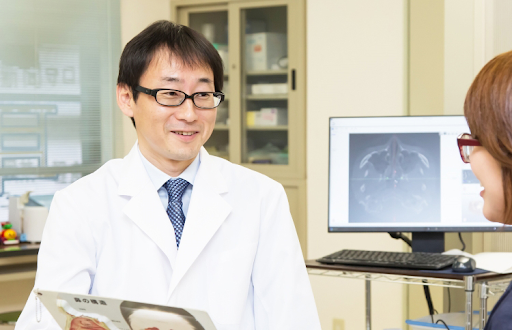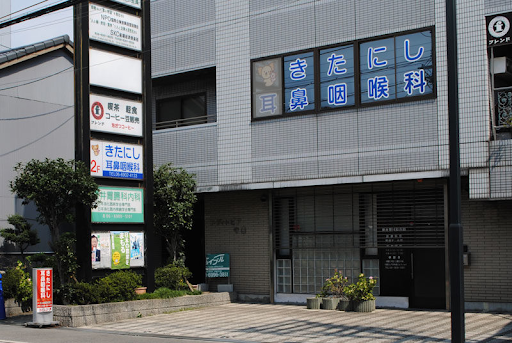Director, Kitanishi Otolaryngology
Dr. Tsuyoshi Kitanishi

“I wish there were options beyond just medicine for this lingering condition…” Have you ever thought something like that?
At Kitanishi ENT Clinic in Osaka, Dr. Tsuyoshi Kitanishi offers an integrative approach to difficult-to-treat conditions such as tinnitus and vertigo—combining Western medicine with natural therapies such as Ayurveda. Though rooted in the local community, the clinic attracts patients from all across Japan.
We spoke with Dr. Kitanishi about the story behind the clinic’s founding and his unique treatment philosophy.
– What inspired you to open your clinic, and what makes it unique?
Dr. Kitanishi: This year marks 20 years since I opened the clinic. ENT (ear, nose, and throat) medicine includes many conditions that don’t show up clearly on tests and don’t respond well to standard treatments. For example, vertigo, hearing loss, and tinnitus often have no obvious solutions, and many patients are treated the same way no matter where they go. I’ve even had a patient who visited 18 other ENT clinics before coming to mine. I wanted to be someone who could offer care for those with no clear treatment path—not just those who respond well to medication.
Before opening the clinic, I worked at a hospital in Shiga Prefecture. At that time, the term “integrative medicine” wasn’t commonly used, but I wanted to work at a facility practicing that style of care. Since no such place existed in the Kansai region, I decided to create it myself. That was the beginning 20 years ago.
What sets us apart from other ENT clinics is our focus on patients who don’t respond well to medications and are struggling. We specialize in treating tinnitus, vertigo, hearing loss, allergic rhinitis, sinusitis, nasopharyngitis, and sensations of discomfort in the throat—areas that many ENT doctors tend to avoid. These conditions don’t have single causes, and there’s limited research due to the lack of animal models. But I personally enjoy listening to patients and hearing the stories behind their symptoms, which can often reveal important insights.
– Can you tell us more about your treatment philosophy?
Dr. Kitanishi: My core beliefs are: “Your best doctor is yourself” and “Prevention is better than cure, and daily self-care is even more important than prevention.” Rather than treating illness after it appears, I believe it’s essential to practice healthy habits every day. I do my best to share these habits and techniques with my patients.
I’ve always had an interest in integrative medicine, even before the term became common. At our clinic, we offer both insurance-covered treatments and non-covered services. These include Ayurveda, homeopathy, nutritional therapy, and German vibrational medicine (bioresonance). We tailor treatments based on each patient’s condition.
As daily self-care, I often recommend nasal rinses and using sesame oil in the nose. In particular, our nasal oil therapy is based on the Ayurvedic method called “Nasya,” which we’ve tested in the clinic for effectiveness in reducing inflammation in the nasopharynx. Our results have even been accepted as an English-language academic paper.
I also serve as the chairman of the Japan Ayurveda Society. In everyday practice, I often recommend that patients use sesame oil drops in the nose—many people are able to avoid prolonged use of steroid nasal sprays this way. It’s a safe, accessible method with few side effects, and I believe it’s a wonderful daily habit.
I think very few ENT doctors are incorporating natural therapies like this. But I believe there are many people out there struggling with conditions that haven’t responded to conventional treatment, and I want to continue caring for those patients.
– What kind of patients do you typically see?
Dr. Kitanishi: A large number of our patients come in with unresolved tinnitus or vertigo. Others are seeking fundamental treatment for chronic nasal issues like sinusitis and hay fever. Even though surgical and pharmaceutical options are increasing, many people still struggle with long-term symptoms. Recently, we’ve also seen more patients with nasopharyngitis—often after being on antibiotics long-term without relief.
We also treat lingering symptoms following COVID-19, including throat discomfort and postnasal drip. Nasopharyngeal treatments like EAT (Epipharyngeal Abrasive Therapy) are part of that care.
In addition, we receive consultations about issues beyond ENT—such as developmental disorders, social withdrawal, or mental health concerns. Patients come to us from Hokkaido to Okinawa and even from overseas. Some seek non-insurance treatments from the start, but many come to us after trying various covered treatments without success and then choose our self-pay services.
– Do you offer supplements at your clinic?
Dr. Kitanishi: Yes, we carry basic vitamins, minerals, digestive enzymes, and antioxidant supplements. Among them, we offer Twendee X (marketed as Oxicut), as well as hydrogen-based supplements. We’ve even started trying hydrogen inhalation through the nose—or more recently, the ears—for patients with tinnitus or hearing loss.
When explaining oxidative stress or glycation to patients, I use simple analogies like “rust and burn” to make it easier to understand. People can relate to the idea that rust or burning leads to things not functioning well. I believe that helping patients understand the science behind the therapy is important for long-term use and better outcomes.
Antioxidants are not just for treating symptoms, but also for daily care. I recommend continued use for those interested in maintaining overall wellness.
– Why did you decide to introduce Twendee X in particular?
Dr. Kitanishi: I first learned about Twendee X through published studies on post-COVID symptoms, as well as from other doctors already using it. We often recommend it to patients with long COVID. Although we see fewer of these cases now, there were times when patients with severe fatigue couldn’t function at all—and after combining EAT and Twendee X, they recovered significantly. Some returned to work, others to school. Many have continued taking the supplement even after they recovered.
In the end, I hope to contribute to a society that goes beyond just “healthy longevity” (living longer), and toward “happy longevity”—where people truly enjoy life and thrive beyond their expected lifespan.
For over 20 years, Kitanishi ENT Clinic has been helping patients who don’t respond to conventional treatments. Dr. Kitanishi’s careful listening and integrative approach offer hope and new options to those suffering from chronic ENT issues. His use of antioxidants, self-care techniques, and personalized therapy stood out as a lifestyle-oriented model of care. As these approaches spread, they have the potential to support many more people in achieving healthier, happier lives.

Kitanishi ENT Clinic
2F Meditopia Moriguchi, 3-7 Yodoe-cho, Moriguchi-shi, Osaka 570-0004, Japan
https://kitanishi-ent.jp/